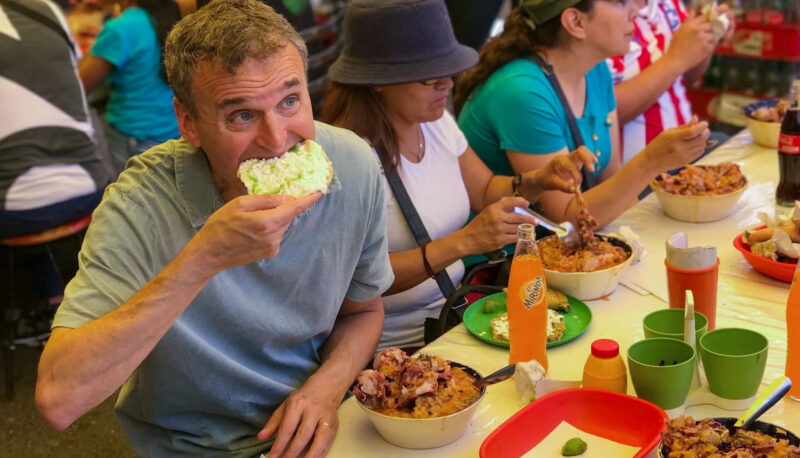Who knew that we needed to watch the writer of “Everybody Loves Raymond” eat his way around the globe? If you haven’t seen the hit Netflix show, then perhaps you haven’t met goofy, sometimes-corny, but always endearing comedy writer Phil Rosenthal. Famous for his work on “Raymond,” he travels the world meeting interesting people and enjoying the best cuisine he can find. While it’s a travel and food show on the surface, the deeper nuances are all about human connection. Here’s why this show matters to me, and why I think it matters right now.
The Luminous Kindness of “Somebody Feed Phil”
In Morocco, Phil bumps into a hotel employee and asks him to show him his favorite local spots. In New Orleans, the 95 year old Chef Leah Chase tells Phil how she fed Dr. King and the Freedom Riders at her legendary establishment Dooky Chase. In Memphis, Phil divebombs a diner table of elderly regulars who meet for lunch every day and call themselves the “table of knowledge.”
Phil has an infectious enthusiasm for food and the people who make it, and he’s never shy about showing off his eagerness to connect with anyone and everyone around a table. His utter delight in treating everyone with dignity and respect reminds us that this is how the world should be. It’s an approach to the world and to people that, to me, seems integral to progressive values.
I love the show because it’s not overtly political – it’s entertainment – but to me it works as a nearly perfect paradigm of progressive political values whether it intends to or not.
Celebrating Our Differences
As Phil travels, he engages humbly and respectfully with the people he meets, never forgetting he is a guest wherever he goes. He embraces different cultures and customs without othering, treating people like they’re strange or acting as though a white, cishet man from the U.S. is the default human being.
In contrast to the Far Right’s tendency to hold up whiteness, maleness, and Americanness as the default if not superior state of humanity, progressivism celebrates differences, learns from diversity, and strives for a world in which everyone can sit down together and enjoy a hearty meal. The more we learn about our differences, the better able we are to craft policies which benefit the whole of society and the more keenly we’re able to identify what truly brings us together.
Remembering Everything We Share
“Somebody Feed Phil” is framed around something we all share: food. Phil uses food to unite his audience, himself, and the people with whom he’s eating. The things we champion as progressives are as uniting as a good meal. Everyone needs and deserves health care, education, and to feel safe and loved in their own skin, just like everyone needs and deserves food. We stand up for these values in our lives, our work, and our political ideologies.
Ideals like kindness, open-mindedness, diversity, and multiculturalism serve as the basis for our policy beliefs, and these ideals should be celebrated for their ability to motivate and inspire.
When we see genuine kindness and appreciation for diversity, whether in the media or in our fellow citizens, we should take the time to recognize and applaud it. It’s nice to have a show that does that for us, and it’s nice to have a show that continues the long tradition of entertainment as one of the best forms of enlightenment. Decades ago, the founder of my organization, Norman Lear, was a trailblazer on that front with shows like “All in the Family” and “The Jeffersons.” “Somebody Feed Phil” is a warmhearted and unassuming show, but it’s also so much more.

